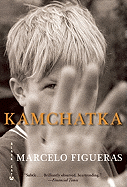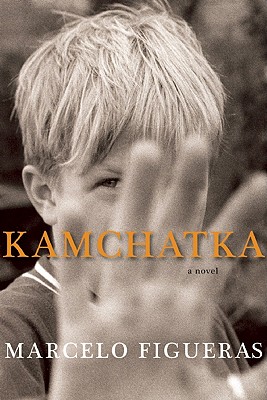
 When the 10-year-old
narrator of this haunting novel tells us in the first sentence that the last
word his papa said to him was, "Kamchatka," the reader gets a shiver
of apprehension. The real Kamchatka is up in the right-hand corner of Asia,
bordering Japan and Alaska, but for the young narrator, it's an imaginary
kingdom in the game of Risk, a secret, savage place of eternal snows and a
hundred volcanoes that's nearly inaccessible, one of the territories waiting to
be conquered in his favorite board game.
When the 10-year-old
narrator of this haunting novel tells us in the first sentence that the last
word his papa said to him was, "Kamchatka," the reader gets a shiver
of apprehension. The real Kamchatka is up in the right-hand corner of Asia,
bordering Japan and Alaska, but for the young narrator, it's an imaginary
kingdom in the game of Risk, a secret, savage place of eternal snows and a
hundred volcanoes that's nearly inaccessible, one of the territories waiting to
be conquered in his favorite board game.
It's 1976, and people are disappearing in Buenos Aires. The delightful family whose company we enjoy in this warmhearted Argentinean novel are struggling to be happy against the current of the times--the political and moral chaos following the coup de etat, the myriad kidnappings, shootings and bombings, as friends, business partners, uncles and neighbors disappear, one by one.
The tale unfolds with disarming simplicity. We're confined to a 10-year-old's limited understanding. We learn just enough to understand that his parents are fleeing for their lives, trying to enjoy their children for as long as they can before the danger becomes so great they have to leave them behind.
Told in the course of five school periods (Biology, Geography, Language, Astronomy, History), the sixth grader doesn't hesitate to throw into the narrative his own history of Buenos Aires from when it was little more than a pestilential swamp, along with a short, reverent biography of his hero, the great escape artist Harry Houdini.
Until that fateful year, he's been accompanied through childhood solely by the Midget, his kid brother, who loves giving instructions on how to mix Nesquik and who compulsively defaces his brother's comics by drawing haloes over the good characters. Then another boy is thrust into his life, sharing his family and his bedroom: tall and skinny Lucas, an 18-year-old with no past ("Wrong question," he tells the curious boy at every attempt to penetrate the mystery), who becomes the narrator's personal trainer as an escape artist. Their friendship is the heart of the novel, the poignant developing trust between two very different boys in the face of encroaching menace.
As he flees with his family, hiding out in the country, taking on new names and identities, the boy becomes like the hero of his favorite television show, The Invaders, unsure which ordinary face conceals a deadly alien. The reader never learns the boy's real name, because "the people who proved to be heroes back then had no names," Figueras tells us, "and that's how we should remember them."
Bursting with good humor, with a bittersweet, melancholy shadow, Figueras's superb novel amply illustrates that "laughing and crying at the same time is something life teaches you without you even noticing." --Nick DiMartino
Shelf Talker: A 10-year-old tells a story of family and friendship in 1976 Buenos Aires, when desaparecidos (the disappeared) became part of the world's vocabulary.

